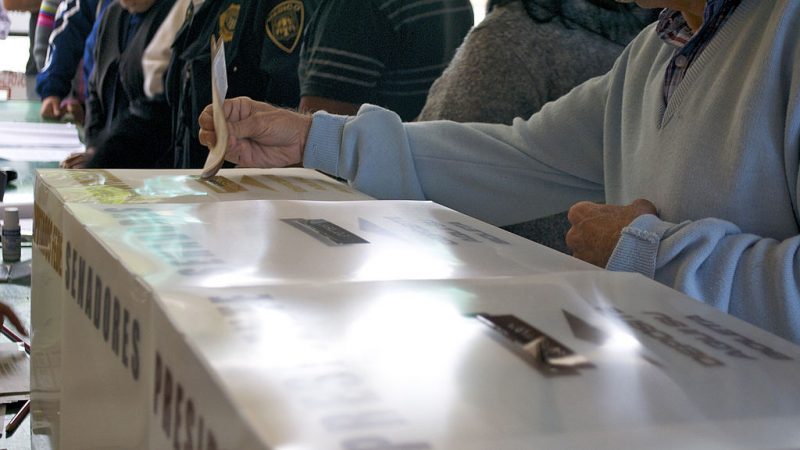Against the backdrop of intense public outrage at the recent increase in gas prices in Mexico, a legislative initiative to reject the excesses of the political class has gained support throughout the country. Called #SinVotoNoHayDinero (#NoVotesNoMoney), the proposal is spearheaded by Manuel Clouthier and Pedro Kumamoto, two independent congressional representatives whose goal is to reduce the income of political parties.
Currently, political parties receive public money based on a calculation that involves the total number of people registered to vote (44.50 Mexican pesos, or approximately 2.14 US dollars, per person). The parties receive this money regardless of whether those registered to vote actually do so in a valid way on election day.
The initiative, which was recently approved by the Congress of the State of Jalisco (a state located in the western part of the country) and sent to the Chamber of Deputies at the federal level, aims to change the way in which public resources are allocated to finance political parties. With this, they hope to involve politicians in electoral participation and reduce the public resources taken by political parties.
The #NoVotesNoMoney website explains the basics of the problem:
Creemos que los partidos reciben demasiado dinero público y que esta fórmula hace que no se esfuercen para conseguir el voto popular. Nuestra propuesta consiste cambiar la fórmula para que en vez de multiplicar el padrón se multiplique la votación valida emitida (votos totales menos votos nulos y en blanco) por el 65% de una UMA. Esto haría que los partidos tengan que esforzarse porque las personas voten en las elecciones y en 2015, hubiese significado un ahorro del 65% (los partidos hubiesen recibido mil 800 millones de pesos).
We believe that the parties receive too much public money and that this formula leads to politicians not making an effort to win the popular vote. Our proposal consists of changing the formula so that instead of multiplying voter registration, the number of valid votes cast (total votes minus invalid or blank votes) would be multiplied by 65% of UMA [Measure and Update Unit, which substitutes minimum wage in some indexes]. This would force the parties to make an effort because people vote in the elections, and in 2015 it would have meant a savings of 65% (the parties would have received 1.8 billion pesos).
They say the proposal would not only save public money, but also encourage participation. In this regard, Pedro Kumamoto, who serves as independent representative for Jalisco, states:
Este tema es central, pues en nuestro actual sistema electoral no hay ningún tipo de restricción o castigo si en una elección no participa la mayoría de los electores. Hemos llegado a las ridículas cifras como el 25% o 30% de participación en estados como Baja California o Chihuahua. Y lejos de ver alguna tendencia que demuestre que los partidos han entendido, nos encontramos con elecciones llenas de guerra sucia, malos candidatos, procesos pantanosos, compra de votos y un debate yermo, lo que termina generando un distanciamiento mayor del electorado regular y, por consecuencia, una menor participación.
This is a central issue, because in our current electoral system there is no type of restriction or punishment if the majority of voters do not participate in an election. We have reached ridiculous participation statistics, like 25% or 30% in states like Baja California or Chihuahua. And far from seeing any trends showing that the parties have understood, we find ourselves in elections full of dirty war, bad candidates, swampy processes, buying votes and barren debate, which ends up creating a greater distance from the regular electorate and lower participation.
Likewise, with this new proposal, null votes would become an effective form of protest because, in effect, exercising a null vote would subtract possible economic resources from the parties.
In the midst of the economic crisis that the country is experiencing and whose consequences are suffered mostly by citizens, a proposal that seeks to restrict the broad privileges of political parties is seen by many as a step forward to social justice, something welcomed by many in Mexican social networks:
Aún con lo situación actual del país, personas como @pkumamoto con iniciativas cómo está le regresan la esperanza. #SinVotoNoHayDinero pic.twitter.com/R426De11n0
— Lisset Gutiérrez (@LissetGtzV) January 18, 2017
Tweet: Even with the country's current situation, people like @pkumamoto with initiatives like this one restore hope. #SinVotoNoHayDineropic.twitter.com/R426De11n0
Image: How does #NoVotesNoMoney work?
Today parties assign your money according to a formula
This must change! We propose
If they want our money, they need to earn our vote
Let's get the parties back to the people
A recortar donde sí se debe: financiamiento público a partidos para que esté vinculado al voto y no al padrón. Apoya #SinVotoNoHayDinero pic.twitter.com/GGetrdBTlF
— Denise Dresser (@DeniseDresserG) January 15, 2017
Cutting back where we should: public funding of parties so that it's linked to the vote and not the register. Support #SinVotoNoHayDinero pic.twitter.com/GGetrdBTlF







